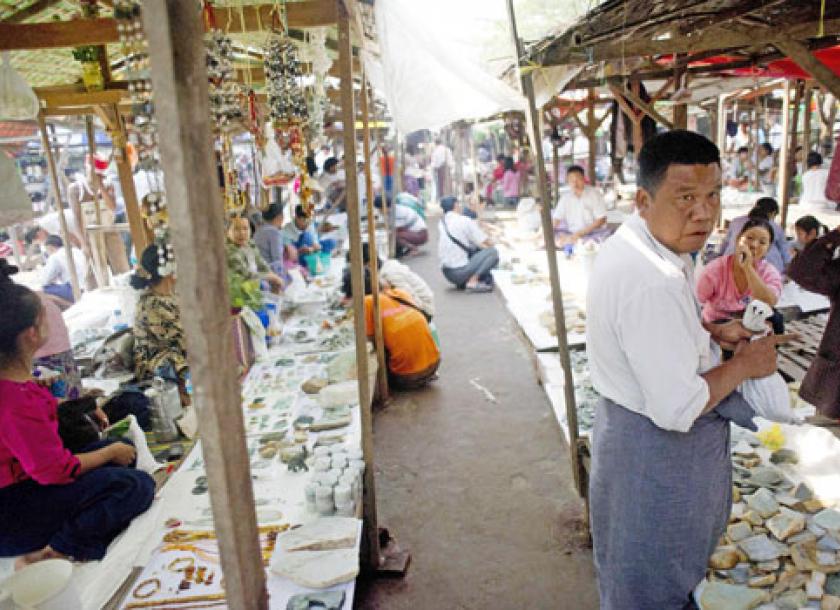
Jade traders say US sanctions have forced them to rely on Chinese investors and buyers, who dodge taxes and operate with little to no transparency. If Washington were to remove sanctions, they say, it would speed up reform in the troubled sector.
Since the US banned imports of gems and jade in 2003, China has all but monopolised the market.
While the industry is technically closed to foreigners, Chinese firms, often working under Myanmar identities, dominate extraction of the precious green stone. Almost all of the extracted jade finds its way to China.
U Win Htain, director general of the mining department under the Ministry of Mines, said he hopes the US will lift sanctions for the benefit of the local industry.
“Buyers from other countries rarely come here – we are forced to sell to China. If sanctions were lifted, we would have more choice, which would bring greater transparency,” he said.
“We would at last be able to develop a market for finished products.”
Chinese buyers prefer to export rough stones and to create finished products back home, which can significantly add to their value. Myanmar traders, unable to sell elsewhere, must continue to supply uncut jade.
U Tun Hla Aung, deputy secretary of Myanmar Gems and Jewellery Association, said if the US relaxed sanctions, it would bring in more business opportunities and boost tax revenues.
The jade industry remains largely unregulated and untaxed. While Chinese import data indicates gemstone imports from Myanmar were worth $12.3 billion last year, Myanmar official figures for 2013-14 put the trade at barely $1 billion. A recent investigation into the sector by advocacy group Global Witness put the value of the sector last year at $31 billion.
Reliance on China has put the jade industry in Myanmar at the mercy of slowing growth in the world’s second-largest economy, said U Tu Khaung, general secretary of Myitkyina Gems and Jewellery Association.
As China’s growth slows – from over 10 percent in 2010 to an expected 6.5pc in 2016 – its government has tightened loan policies. In the past, Chinese lenders lent relatively freely to jade merchants and investors. Faced with rising non-performing loans, they have tightened policy.
As a result, Chinese demand has slowed, and Myanmar traders have struggled, said U Tu Khaung. Profits at markets in Mandalay, Myitkyina and Nay Pyi Taw have been falling, he said.
“It would be best if the US lifted sanctions. Traders are forced to rely on Chinese demand, which has slowed over the past few years.”
Deserted by Chinese buyers, the gems market in Kachin State is struggling, and shops are closing as prices fall. In Mandalay’s Maha Aung Myay jade market too, prices show no signs of recovery. Traders previously told The Myanmar Times they are holding stock to avoid selling at a loss.
Traders say a crackdown on corruption in China, and a shortage of high-quality stones, do not help poor market conditions. The most valuable stones are bought directly from the mines at Hpakant by Chinese traders and never reach Myanmar’s markets.
Free from sanctions, jade could be sold internationally, increasing competition and allowing the price of stones to rise, U Tun Hla Aung said.
“If prices rise, we could sell fewer products for the same profit, which means we could reduce the pace of mining activity. There might be some market control. This would be better,” one jade trader said.
A Reuters report this week said Chinese firms have been aggressively ramping up mining activity at Hpakant’s jade mines since the start of the year, in anticipation that the industry could be reformed once the National League for Democracy-led government takes power in March.
Myanmar miners told Reuters they cannot stand up to Chinese tycoons, with their influence and heavy machinery. The fervent activity has coincided with a spike in deadly landslides. A November 21 landslide killed at least 114 people, and another landslide this week killed at least one person, with dozens more missing.
Jade trader Ko Su says he is hopeful. “We believe the next government will implement change, and that sanctions might be lifted,” he said.
For Global Witness, the new government should begin by conducting investigations into criminal activities in the jade industry, including drug traffickers and money launderers.
This will be a challenge, as it will share power with the Tatmadaw, which has constitutional control over the interior ministry and police force, as well as vast business interests.
The jade industry is an important test of US foreign policy in Myanmar, Juman Kubba of Global Witness said in October. The US supports the Extractive Industries Transparency Initiative, which Myanmar’s government has voluntary applied to join. Global Witness sits on the EITI’s board, and has asked Washington to benchmark sanctions against jade sector reforms.
Priorities should include sharing control and benefits with people in Kachin State, and making businesses accountable to the public, Ms Kubba said. “The US is uniquely placed to help take the jade out of the hands of the military, cronies and drug lords. It must make this a priority for its partnership with the new government.”
A US embassy spokesperson said yesterday that calibrated sanctions remain in place, including an import ban to the US on Myanmar-origin rubies and jadeite. “We continue to review all of our policies, including sanctions, assistance, and economic and commercial engagement,” he said.
“As we determine how to proceed, we are looking for progress on a wide range of issues. These include the political transition following the recent electi2ons, the peace process, support for and protection of human rights, and constitutional reforms.”
Translation by Kyawt Darly Lin
